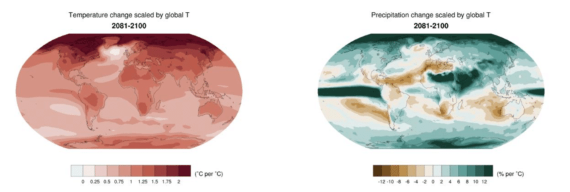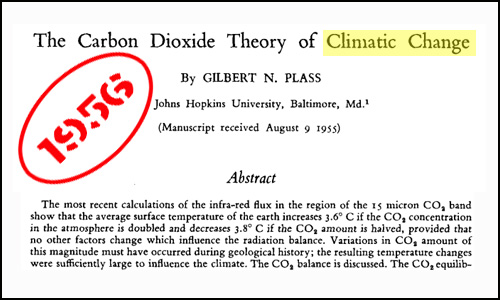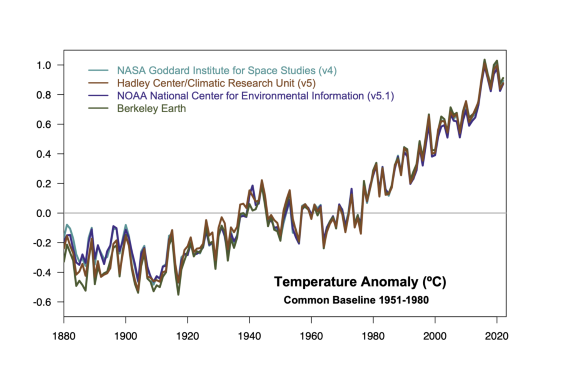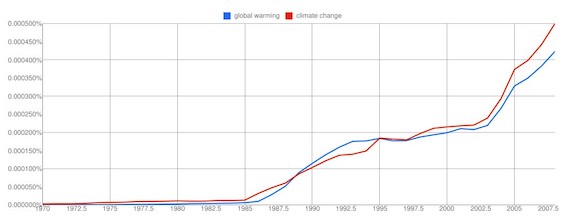Global warming vs climate change
What the science says...
| Select a level... |
 Basic
Basic
|
 Intermediate
Intermediate
| |||
|
The terms ‘global warming’ and ‘climate change’ have been used interchangeably for several decades. |
|||||
Climate Myth...
They changed the name from 'global warming' to 'climate change'
They changed the name from “global warming” to “climate change” after the term global warming just wasn’t working (it was too cold)! (Donald J. Trump)
At a glance
Have you heard this one? The quote above may be from Trump (a March 2013 tweet) but it's a really common talking-point. It's also utterly meaningless. Firstly, we have the arm-wavy word, "they". Who are 'they'? The United Nations? Greenpeace? The Democrats? Who are 'they'? Let's take a look: depending on your politics you might be surprised.
In the past, global warming and climate change were both in regular use. For example, the landmark 1956 paper that summed up all the accumulated knowledge of the past 100 years was called, "The Carbon Dioxide Theory of Climatic Change". So both terms have been around for ages. In fact, they mean slightly different things. 'Warming' means a rising temperature whilst 'climate' encompasses a lot more issues, such as how wet or dry it is. But who are 'they'?
Step forward Republican advisor and strategist Frank Luntz. Here's the background. In 2002, prior to the midterms, the G.W. Bush administration - not exactly famous for its environmental track-record - sought advice on policy communication. Regarding the climate, Luntz commented thus:
"The scientific debate is closing [against us] but not yet closed. There is still a window of opportunity to challenge the science."
Uh-oh. Look out, reality ahead. Evasive action required! Luntz went on to advise:
"The terminology in the upcoming environmental debate needs refinement, starting with “global warming” and ending with “environmentalism.” It’s time for us to start talking about “climate change” instead of global warming and “conservation” instead of preservation".
The briefing went on to justify the suggested changes:
"“Climate change” is less frightening than “global warming.” As one focus group participant noted, climate change “sounds like you’re going from Pittsburgh to Fort Lauderdale.” While global warming has catastrophic connotations attached to it, climate change suggests a more controllable and less emotional challenge."
So there you have it. The only recorded political move to emphasise the term, 'climate change', over 'global warming' was to try and make the latter feel a bit cuddly to prospective Republican voters in 2002. Who are 'they'? 'They' were the Republicans.
But next time you run into someone trying to suggest this 'change' happened much more recently, you have now got the name of the 1956 paper to mention. If that's not enough, you can also ask them what "CC" stands for in IPCC. It stands for climate change and the IPCC was founded in 1988, fully 35 years ago at the time of writing. Like all climate science denial talking-points, a little scrutiny is all that is needed and they fall down flat. In this case, even less scrutiny than usual!
Please use this form to provide feedback about this new "At a glance" section. Read a more technical version below or dig deeper via the tabs above!
Further details
Both of the terms in question, 'global warming' and 'climate change', are used frequently in the scientific literature, because they refer to two different physical phenomena. As the name suggests, 'global warming' refers to the long-term trend of a rising average global temperature, which you can see in fig.1:
Fig. 1: some temperature datasets. All are heading the same way. That's global warming. Graphic: Realclimate.
'Climate change', again as the name suggests, refers to the changes in the global climate which result from the increasing average global temperature. For example, changes in rainfall patterns, increased prevalence of droughts, heat waves and other extreme weather. Projections of future global temperature and precipitation changes (fig. 2) are an example of climate change:

Fig. 2: Patterns of temperature (left) and percent precipitation change (right), averaged across CMIP6 models and all Tier 1 plus SSP1-1.9 scenarios). Climate change deals with a bigger picture relative to global warming. From Tebaldi et al. 2021.
Thus, while the physical phenomena are causally related, they are not quite the same thing. Human greenhouse gas emissions are causing global warming, which is in turn causing climate change. However, because the terms are causally related, they are often used interchangeably in normal daily communications.
Both Terms Have Long Been Used
The argument, "they changed the name", suggests that the term 'global warming' was previously the norm, and the widespread use of the term 'climate change' is new. However, this is simply untrue. For example, a seminal climate science work is Gilbert Plass' 1956 study 'The Carbon Dioxide Theory of Climatic Change' (fig. 3). Plass estimated the climate sensitivity to a doubling of atmospheric carbon dioxide to be 3.6°C, not far off from today's widely accepted most likely value of 3°C. Barrett and Gast published a letter in Science in 1971 entitled simply 'Climate Change'. The journal 'Climatic Change' was created in 1977 (and is still published today). The IPCC was formed in 1988, and of course the 'CC' is 'climate change', not 'global warming'. There are many, many other examples of the use of the term 'climate change' many decades ago. There is nothing new whatsoever about the usage of the term.

Fig. 3: a screengrab of the landmark Plass paper, published in 1956 - or 67 years ago at the time of writing!
In fact, according to Google Books, the usage of both terms - in books published in the United States - has increased at similar rates over the past 40 years(fig.4):
Fig. 4: historical usage of the terms 'climate change' and 'global warming' in books published in the USA.
And a Google Scholar search reveals that the term 'climate change' was in use before the term 'global warming', and has always been the more commonly-used term in scientific literature (fig.5):
Fig. 5: historical Google Scholar searches for global warming and climate change. Again, both are searched for but this time, climate change is ahead, going back decades.
No Reason to Change the Term
Those who perpetuate the, "they changed the name" myth generally suggest two reasons for the supposed terminology change. Either because (a) the planet supposedly stopped warming, and thus the term 'global warming' is no longer accurate, or (b) the term 'climate change' is more frightening.
The first premise is demonstrably wrong and somewhat dated. As fig.1 clearly shows, the planet continues to accumulate heat.
The second premise is also wrong, hilariously so, as demonstrated by perhaps the only individual ever to actually advocate changing the term from 'global warming' to 'climate change'. That was none other than Republican political strategist, Frank Luntz, in a now controversial memo (PDF), advising conservative politicians on communicating about the environment. He wrote:
"It’s time for us to start talking about “climate change” instead of global warming and “conservation” instead of preservation."“Climate change” is less frightening than “global warming”. As one focus group participant noted, climate change “sounds like you’re going from Pittsburgh to Fort Lauderdale.” While global warming has catastrophic connotations attached to it, climate change suggests a more controllable and less emotional challenge."
Summary
So to sum up, the term 'climate change' has been in frequent use in the scientific literature for many decades and the usage of both terms has increased over the past 40 years. Moreover, since the planet continues to warm, there is no reason to change the terminology. Perhaps the only individual to advocate the change was a Republican political strategist and global warming skeptic, who used focus group results to determine that the term 'climate change' is less frightening to the general public than 'global warming'. So there is simply no factual basis whatsoever to the myth "they changed the name from global warming to climate change". Case dismissed.
To explore this topic further, the chapter, 'Polluted Discourse: Communication and Myths in a Climate of Denial' (Jacobs et al. 2016) is a deep drill-down into the evolution of this, among other, climate myths. If it becomes freely available we'll update this rebuttal.
Last updated on 22 October 2023 by John Mason. View Archives































 Arguments
Arguments
































Recommended supplemental reading:
Debunking the claim ‘they’ changed ‘global warming’ to ‘climate change’ because warming stopped by Jason Samenow, Capital Weather Gang, Washington Post, Jan 29, 2018
John: your link at #26 just points back to skepticalscience.com.
[JH] Glitch fixed. Thank you for bringing it to my attention.
I believe that scientist gives the different meaning of climate change and global warming. One reason that I notice about scientist wouldn't change the name of global warming to climate change because global warming could define only the meaning of the increase in Earth’s average surface temperature due to rising levels of greenhouse gases, but climate change could define as a long-term change in the Earth’s climate, or of a region on Earth that can be hotter or colder if compare over period of time. They could say that global warming is one type of climate change because it is also about the temperature that changing but they cannot change the word from global warming to climate change.
emmy
What you said is correct. There is also a 3rd term that only gets used occassionally. The Enhanced Greenhouse Effect. We can think of it like this.
The first use I am awars of of the term Climate Change was in a paper by Gilbert Plass in 1956 titled 'The Carbon Dioxide Theory of Climatic Changes' - note he used Climatic, not Climate. And the Climate Change Plass and people before him were more interested in was the answer to what caused the ice ages. It was only as they investigated this question that they started to realise that this might mean climate changes in the future as well.
I also agree with emmy.
Glenn, "Climatic change" has been used before Plass in the same meaning. An example is Manley (1944) discussing Callendar's work. Callendar himself also has used the term, at least in his 1949 paper. I studied the history of the terms in scientific literature some time ago, and earliest use of "global warming" I found was in 1961. "Climate change" was used as early as 1927, if I remember correctly (but that was not used in the modern sense), and "climatic change" could be traced back to 1850s at least.
Another, even broader term that is relevant here is "global change", which is commonly used to describe the overall environmental change happening on Earth (in addition to climate change, it describes the change in the biosphere for example).
Also on terminology, the greenhouse effect used to be called "selective absorption of the atmosphere" in 19th century.
Recommended supplemental reading:
Climate Change Or Global Warming? Three Reasons Not To Be Distracted By The Name Game by Marshall Shepherd, Science, Forbes, Apr 13, 2018
Do climate scientists use the term Anthropogenic Global Warming?
Is this the proper term used in climate science? If not what is the proper term for human caused climate change?
yes they do. It is an accurate term. Lukewarmers and deniers to CAGW (catastrophic AGW) for strawman arguements. Scientists never this term.
Hi,
Thank you for your work. Could you give the details of your Google plot please ? I failed to replicate it, I obtained this graphic. which sadly, though it does not show a decrease in the use of Global Warming, still could be interpreted by some (probably including the person I am trying to convince) as a decoupling of the two. This can probably be justified as Global Warming is only one of the aspects of Climate Change and maybe the news focused more on the other consequences after 1995, but I think to avoid accusations of bad faith maybe it would be better to have access to the steps to replicate this.
Cheers
[JH] The graphic linked to exceeded page width limit of 350 pixels. I embedded it into the word "graphic".
HelloThere @34,
The difference between your plot & the plot in the OP is the "corpus" searched. You use 'Corpus15' = "English" while the OP uses 'Corpus5' = "American English 2009" although there is little difference using 'Corpus17' = "American English". (The OP also uses a smooting of 3 while you use 5, but that is of no significance.)
Hi,
How did you obtain the graphic comparing climate change and global warming in Google Scholar? I could not replicate it and it has no source so I can't really use it in arguments I have been having on this specific point.
Thanks.
Yaeger @36,
If it is the Google Books Ngram Viewer graphs (as per the 3rd grahic in the OP), the link here (also linked within #34) takes you there. Enter the variables you desire and voilà.
If it is the Google Scholar data (as per the 4th graphic in the OP), it isn't clear to me how exactly that graphic was created but if you search Google Scholar for a particular term and a particular period, it does return how many 'results' it found, although I wouldn't be sure how accurate or reliable that 'returns' value is. (I see GWPF blogs listed which are not scientific documents and are dated as 1912 instead of 2012.) Yet it does support 'Global Warming' being a less used phrase than 'Climate Change' in scientific articles although the "the term 'climate change' was in use before the term 'global warming'" assertion in the OP isn't as strongly evident as that graph suggests.
Recommended supplemental reading:
There is no evidence that ‘global warming’ was rebranded as ‘climate change’ by Giulio Corsi, The Conversation UK, Mar 12, 2020
Please note: a new basic version of this rebuttal was published on October 22, 2023 which includes an "at a glance“ section at the top. To learn more about these updates and how you can help with evaluating their effectiveness, please check out the accompanying blog post @ https://sks.to/at-a-glance